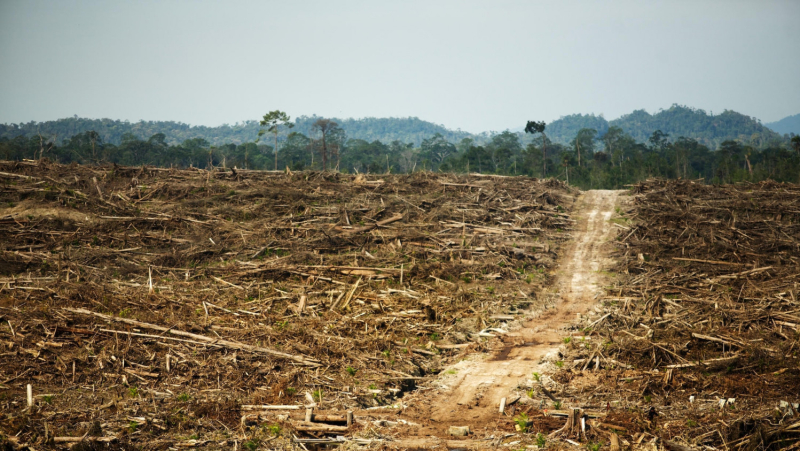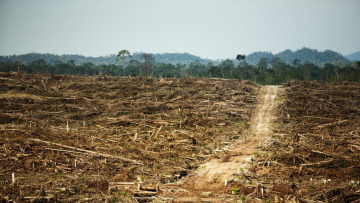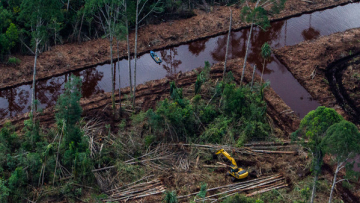First test of ‘Net Zero’ bank commitments as pulp & paper giants seek finance for expansion that could torpedo Indonesia’s climate goals
Merel van der Mark, Coordinator, Forest & Finance Coalition, merel@ran.org
Karen Vermeer, Coordinator, Finance Working Group, Environmental Paper Network (EPN), +31 6 3942 4524 (CET), karen@environmentalpaper.org

Merel van der Mark, Coordinator, Forest & Finance Coalition, merel@ran.org
Karen Vermeer, Coordinator, Finance Working Group, Environmental Paper Network (EPN), +31 6 3942 4524 (CET), karen@environmentalpaper.org
New analyses released today by a coalition of civil society organizations reveal significant material risk to banks and investors exposed to two of the world’s largest pulp and paper companies –– Asia Pulp & Paper (APP) and Asia Pacific Resources International (APRIL). Following high-profile financial sector promises announced at COP26 in Glasgow, the coalition says that this is a first test of ‘net zero’ bank commitments and warn financial institutions to not support the dangerous expansion proposed by the two pulp companies if banks aim to deliver on these ‘net zero’ promises.
The two pulp giants have both recently released plans to expand the pulping capacity of their mills, increasing pressure on one of the world’s largest terrestrial stores of carbon: Indonesia’s peatlands and rainforests. The capacity expansions of 150% and 55% respectively will cost several billion dollars, which they will be seeking to raise from international banks. Recent reports suggest APRIL is in talks with creditors for a self-arranged “sustainability loan” of $650 million that may facilitate the expansion. The coalition of civil society organisations includes the Indonesian KOAR Network, Forests & Finance, the Environmental Paper Network and BankTrack.
“While major global banks are pledging to be Net Zero and Paris-aligned, they are simultaneously exposed to this ticking climate timebomb. How these banks now respond to APP’s and APRIL’s expansion plans will be a litmus test for their climate commitments,” said Merel van der Mark, coordinator for the Forest & Finance Coalition. “Moreover, Net Zero implies that business-as-usual polluting can be netted off through carbon offsets, reducing incentives for banks to reduce their absolute emissions. This is faulty logic and a dangerous distraction from the urgent need to cut emissions from both fossil fuels and forests.”
The new analysis by civil society groups finds that neither pulp company appears to have accurately disclosed the chronic risks to their business due to their dependence on peatlands for wood fiber, as well as other serious risks linked to land rights conflicts and deforestation. The companies have a checkered past as well. Both companies left creditors with steep losses in 2001 in the wake of the Asian Financial Crash. APRIL was delisted from the NYSE and APP’s $14 billion default remains one of the largest in emerging market history.
New analysis from Forests & Finance shows that APP’s and APRIL’s major financiers include ten banks with commitments to achieve ‘Net Zero’ by 2050 or earlier, and/or have pledged to align their portfolios with the Paris Climate Agreement under the UN Principles for Responsible Banking (UNPRB) (1). Of these, eight banks are currently exposed to APP and/or APRIL, with outstanding loans of USD 1.1 billion. These include International and Commercial Bank of China (ICBC), Mitsubishi UFJ Financial (MUFG) and Mizuho Financial, ABN Amro, First Abu Dhabi (FAB), Maybank, Intesa Sanpaolo and Credit Suisse. Two more banks with ‘Net Zero’ commitments, Barclays and Bank of Montreal are advising APP’s owners to expand into the North American market through its controversial $1.95 billion privatization of Domtar (NYSE:UFS), one of the largest paper producers in the United States.
The new analysis also exposes that APP and APRIL produce globally significant levels of greenhouse gases (GHGs) through their enormous demand for wood fiber, much of which is grown on carbon-rich peat soils. Peatlands are the world’s largest natural terrestrial store of carbon, that when drained for cultivation, produce around 6% of manmade global emissions. Their pulp mills are supplied by plantations covering 87,000 km2 of drained peatland. Based on findings from the latest scientific papers on emissions from Indonesia’s peatlands, Forest & Finance estimates that on average between 2015 and 2019, these plantations emitted 111 million tons CO2e per year through subsidence and fire events. An estimated 80% of these emissions come from APP supplier plantations and 20% from those of APRIL. (2) This is equivalent to a fifth of Indonesia’s entire annual energy emissions, a country with a population of 274 million people. APP would not confirm to us whether it even measures its land use emissions, while APRIL has stated that it has conducted a study but is “not publishing baseline emissions levels at this time”. APRIL stated that it is reducing its emissions through managing peatlands, a zero fire and zero deforestation policy.
“APP and APRIL are amongst the most polluting businesses in Southeast Asia. Moreover, they’re linked to many severe cases of land rights and human rights violations, and still source from companies that are clearing rainforest,” said Made Ali, Coordinator of Jikalahari, Riau- a member of the KOARR network. “Their planned expansions are a reckless doubling down on a carbon-intensive business strategy in the midst of a climate crisis.”
“With all countries seeking to transition to low-carbon economies, the CO2 profile of these pulp businesses is a major risk,” said Karen Vermeer, Coordinator Finance Working Group of EPN. “APP and APRIL’s obscuring of emissions data should ring alarm bells for their creditors and investors. Both groups spectacularly imploded twenty years ago. Bank and investor money is once again at risk.”
See the two analyses for full details:
-
Forest & Finance Coalition, ‘Inherent Risk: APRIL’s planned pulp expansion poses financial risk for banks and investors’
-
BankTrack/Environmental Paper Network, ‘Asia Pulp & Paper: Risk briefing for banks and investors’
Notes for editors
(1) ABN Amro, Bank of Jiujiang, CIMB Group, Credit Suisse, First Abu Dhabi Bank, Industrial and Commercial Bank of China (ICBC), Intesa Sanpaolo, Mitsubishi UFJ Financial, Mizuho Financial, Malayan Banking (Maybank)
(2) Emissions from peatland subsidence: calculated by multiplying the planted area on peatland by 73 tons CO2e/ha/year (derived from Hooijer et al. 2012). This excludes emissions from subsidence in adjacent non-planted peatland areas, and also assumes all planted areas have been drained and planted on for more than five years. Emissions from fire events on peat: calculated by multiplying burned area on peatland for each year by 842 Mg CO2e/ha (derived from Vasquez et al. 2020 ‘Estimating Greenhouse Gas Emissions from Peat Combustion in Wildfires on Indonesian Peatlands’, Global Biogeochemical Cycles). This excludes emissions from fires on non-peatland areas, fires that spread outside of concession areas and fires that may have occurred on the same area of peatland during a single year.


